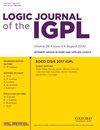Do predictions destroy predictability? A study focusing on stock markets
IF 0.8
4区 数学
Q2 LOGIC
引用次数: 0
Abstract
Predicting stock markets is a problem that has generated many answers. According to one group of responses, the divergence thesis, it is impossible to accomplish this since the prediction has a ‘bending effect’ that would cause the market to behave in a way that would permanently depart from what was predicted, i.e. the prediction would falsify itself. There are at least three types of impossibility: logical, theoretical and empirical. A second class of responses argues that despite the ‘bending effect’ of predictions, it is still feasible to predicting stock markets. These responses, the convergence thesis, contend that we can achieve it by demonstrating that there are fixed points or that the prediction and market behavior will eventually converge. I expand this line of reasoning by showing that the performativity makes it possible certain predictions by an alignment between the ‘ontic’ and the ‘epistemic’ state of the markets. In addition, I show that performativity enables us to explain how a prediction is produced, why it works initially and then why it fails (i.e. why its predictive power is destroyed).预测会破坏可预测性吗?以股票市场为重点的研究
预测股票市场是一个产生过许多答案的问题。其中一类答案,即 "背离论 "认为,预测是不可能实现的,因为预测会产生 "弯曲效应",导致市场行为永久偏离预测,即预测会自我证伪。不可能至少有三种类型:逻辑上的、理论上的和经验上的。第二类回应认为,尽管预测存在 "弯曲效应",但对股票市场进行预测仍然是可行的。这些回应,即趋同论,认为我们可以通过证明存在固定点或预测与市场行为最终会趋同来实现这一点。我扩展了这一推理思路,证明表演性通过市场的 "本体 "和 "认识 "状态之间的一致性,使某些预测成为可能。此外,我还证明了表演性使我们能够解释预测是如何产生的,为什么它最初会奏效,然后又为什么会失败(即为什么它的预测能力会被摧毁)。
本文章由计算机程序翻译,如有差异,请以英文原文为准。
求助全文
约1分钟内获得全文
求助全文
来源期刊
CiteScore
2.60
自引率
10.00%
发文量
76
审稿时长
6-12 weeks
期刊介绍:
Logic Journal of the IGPL publishes papers in all areas of pure and applied logic, including pure logical systems, proof theory, model theory, recursion theory, type theory, nonclassical logics, nonmonotonic logic, numerical and uncertainty reasoning, logic and AI, foundations of logic programming, logic and computation, logic and language, and logic engineering.
Logic Journal of the IGPL is published under licence from Professor Dov Gabbay as owner of the journal.

 求助内容:
求助内容: 应助结果提醒方式:
应助结果提醒方式:


